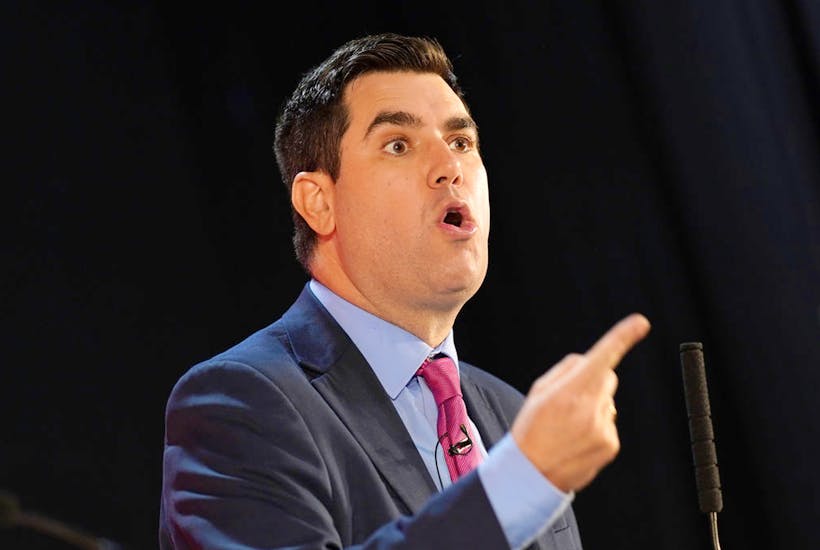Richard Burgon is an idiot. Yes, I know you subscribe to The Spectator expecting more high-brow invective but I believe in being direct. Now, ordinarily I’d be in favour of leaving such a simple creature to his own devices, but this is the Labour Party we’re talking about, so Daisley’s First Law applies: The worst candidate in any Labour election is the one most likely to win.
Elections for the deputy leader of the Labour party are generally to be filed under ‘private grief’, but Burgon is bent on spreading the misery around. He wants to be ‘campaigner in chief’ and pledges that, ‘within the first month of being deputy leader I will visit every single seat we lost’. If the people of Bishop Auckland don’t regret voting Tory yet, they soon will. Worse, he threatens that, ‘by halfway through this parliament I will have visited every single seat in the country’. No wonder support for Scottish independence is on the rise.
There is, however, a more compelling reason to pay attention to the deputy leadership election: like that for party leader, the outcome will be some indication of Labour’s contrition (or lack of it) for the past four and a half years.
On the deputy slate, Burgon is the continuity Corbyn candidate, arguing:
‘While Jeremy Corbyn failed to win a general election, he decisively shifted Labour from lukewarm opposition to cuts and close association with illegal wars to offering a real alternative.’
He also decisively shifted 54 seats from Labour to the Tories. Plus the last time Labour had a close association with illegal wars, it won an historic third consecutive election with a 66-seat majority. Would that all Labour leaders were in the illegal war-associating business, then we could do away with the Tory party altogether.
Burgon represents a continuity with Corbyn in another, more troubling sense. In a 2014 speech, he said:
‘The enemy of the Palestinian people is not the Jewish people. The enemy of the Palestinian people are Zionists, and Zionism is the enemy of peace and the enemy of the Palestinian people.’
I doubt Burgon knows all that much about Zionism or the Palestinians. He probably thinks the Palestine Mandate is a surprisingly progressive nightclub in Khan Yunis. But he knew what ‘Zionism’ meant to his audience and that’s enough. We know he knew because, when first questioned about these words by Andrew Neil, he claimed not to have said them, only for video evidence to emerge subsequently. We also know he knew because of the first sentence and its attempt to create a false dichotomy between Jews and Zionists. It is a prophylactic sentence, said to be cited later in exculpation if needed. And it is a dishonest one: nine in ten British Jews support Israel’s right to exist as a Jewish state and say it forms part of their Jewish identity.
Words have meaning, even words used by Richard Burgon, and when we turn to that second sentence it confirms the direction of travel. Zionists believe that Jews have a right to a state in their ancient homeland, the Land of Israel. To call Zionists ‘the enemy of the Palestinian people’ and Zionism ‘the enemy of peace’ is to say that the existence of a Jewish state, rather than Palestinian and other refusal to accept the existence of a Jewish state, is the source of the conflict. More insidious still, it sets up Palestinian nationhood and Jewish nationhood as irreconcilable, an echo of the very rejectionist rhetoric that has hindered co-existence.
Burgon has not signed up to the Board of Deputies’ ten-point pledge on fighting anti-Semitism. He is one of only two leadership or deputy leadership contenders not to do so. (The other, Dawn Butler, has the excuse of being the shadow equalities secretary, and ‘equalities’ isn’t meant to cover Jews. It’s meant to cover other minorities. You know, the good ones.) It’s not like the pledges are ‘Move the embassy to Ma’ale Adumim’ and ‘Pretend to enjoy Sabra hummus’. They’re exceedingly reasonable positions, including ‘ensure transparency’ and ‘provide no platform for bigotry’.
Declining to put your name to a few words on the need for your party to stop being so wretched to Jews sends a message, and not just to Jews. Again, the man knows his audience. Even Wes Streeting has spoken out against Burgon’s stance, which tells you two things: 1) It’s really bad, and 2) There must not be an election on at the minute.
None of the candidates for leader or deputy leader have distinguished themselves on the issue of anti-Semitism. After all, each of them seemed to shrug off the fears of British Jews in an effort to put their anti-Semitic party into Downing Street. But there are those who seem minded to confront the problem and those who do not. Labour cannot elect a semi-respectable leader who promises to address the party’s anti-Semitism alongside a deputy who winks and nods to those in the grassroots who think the problem doesn’t exist.
Richard Burgon is an idiot and as deputy leader he would offer Labour’s opponents an endless supply of gaffes. But whether or not he could spell his own name with a full tin of Alphabetti Spaghetti is of secondary importance to the signal his election as deputy leader would send. Labour would be saying that its post-election contrition over anti-Semitism was feigned and that its heart is with a man who can’t even bring himself to feign it.







Comments